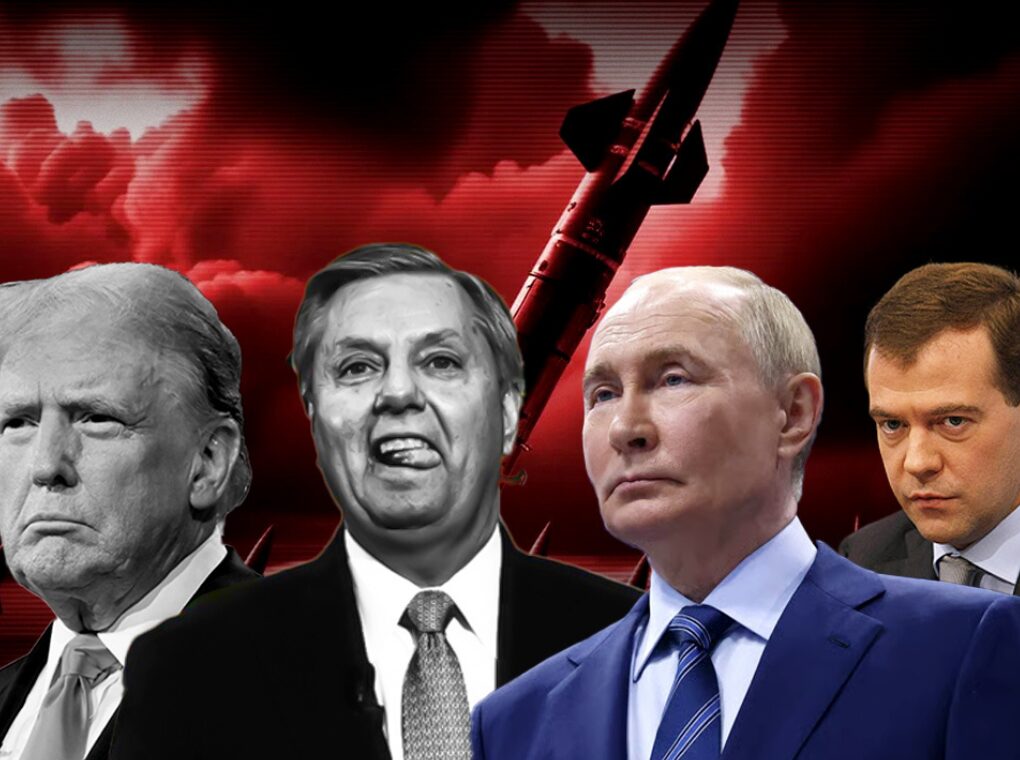A recent social media tussle between former Russian President Dmitry Medvedev and U.S. Senator Lindsey Graham brought to light the growing tensions over the ongoing war in Ukraine and the increasingly urgent efforts by former President Donald Trump to push for a ceasefire. At the heart of the exchange was Trump’s dramatic ultimatum demanding Russia end its military operations in Ukraine within 10 to 12 days or face intensified sanctions and diplomatic pressure—a warning that sparked sharp rebuke from Medvedev, a close ally of Vladimir Putin.
Graham’s Warning and Trump’s Ultimatum: Pressuring Moscow
Lindsey Graham, one of the staunchest advocates for a tough U.S. stance against Russia, amplified Trump’s ultimatum on the social media platform X. Graham urged Medvedev to “get the Kremlin to the peace table,” warning that the “bloodbath” in Ukraine would continue if Russia and its trade partners did not relent.
Graham’s posts referenced his earlier proposals to impose severe tariffs—up to 500%—on countries like India and China that continue to purchase Russian oil, making clear that economic pressure on Moscow’s “customers” was part of the United States’ strategic toolkit. His message underscored bipartisan Congressional support for Trump’s efforts, signaling united legislative backing for a hardline stance designed to force Russia’s hand.
Medvedev’s Sharp Rebuttal: Ultimatums as Steps Toward War
In response, Medvedev did not mince words. His reply framed Trump’s ultimatum as reckless brinkmanship that risked escalating conflict beyond Ukraine, potentially drawing the U.S. into direct confrontation with Russia.
Medvedev wrote pointedly:
“Trump’s playing the ultimatum game with Russia: 50 days or 10… He should remember two things: 1. Russia isn’t Israel or even Iran. 2. Each new ultimatum is a threat and a step towards war. Not between Russia and Ukraine, but with his own country. Don’t go down the Sleepy Joe road.”
This tweet doubled down on themes common in Russian political rhetoric—emphasizing sovereignty, rejecting external pressure, and warning against underestimating Russia’s resolve. By invoking a direct “step towards war” with the U.S., Medvedev elevated the stakes of Trump’s demand beyond a bilateral Ukraine-Russia conflict, suggesting it risked wider confrontation.
Trump’s Shortening Deadline and Frustration
Trump initially set a 50-day deadline on July 14 for Putin to end the conflict but later reduced it to “about 10 or 12 days,” emphasizing his impatience and skepticism about Putin’s intentions. Trump expressed frustration over repeated violence:
“There is no reason in waiting… I really felt it was going to end. But every time I think it’s going to end, he kills people. I’m not so interested in talking (to him) anymore.”
This public airing of dissatisfaction underscored Trump’s eagerness to see swift resolution, and his readiness to back punitive measures if peace was not forthcoming.
Escalating Rhetoric Reflects Deepening Frustration
Trump’s shortening of the deadline and Graham’s vocal warnings mirror growing impatience within certain U.S. political circles with the drawn-out conflict. The use of hard deadlines and economic sanctions signals an attempt to increase pressure on Russia’s leadership and its allies.
Medvedev’s Response Marks Defiant Posture
By rejecting the ultimatum as a trigger for broader war, Medvedev reinforces Russia’s message of resilience and warns of serious consequences should the U.S. overplay its hand. Positioning Russia distinct from other countries often compared in global sanctions contexts (such as Iran or Israel) highlights Moscow’s confidence in its strategic position.
Social Media as a New Battleground for Diplomacy and Threats
The public nature of this exchange on Twitter-type platforms underlines how modern geopolitical disputes are increasingly fought online, with messaging serving both domestic propaganda and international signaling purposes.
Graham’s threat to target Russia’s trading partners echoes a shift toward constraining Moscow’s global economic relationships, not just military options. This globalizing of sanctions heightens the conflict’s complexity, pulling in third-party nations and complicating diplomatic solutions.
A High-Stakes War of Words with Real-World Implications
The Twitter exchange between Dmitry Medvedev and Lindsey Graham around Trump’s 10-12 day ultimatum captures the heightened tensions—and mutual distrust—defining the Russia-Ukraine conflict’s current phase. Medvedev’s fiery rebuttal exemplifies Russia’s unwillingness to bow to external ultimatums, while Graham’s pointed calls reinforce a determined U.S. push for resolution through maximum pressure.
This verbal sparring reveals a dangerous interplay where diplomatic efforts, strategic threats, and public messaging intertwine. As deadlines approach and rhetoric escalates, the risk of miscalculation grows, highlighting the fragile nature of a conflict that remains deeply resistant to swift resolution.
